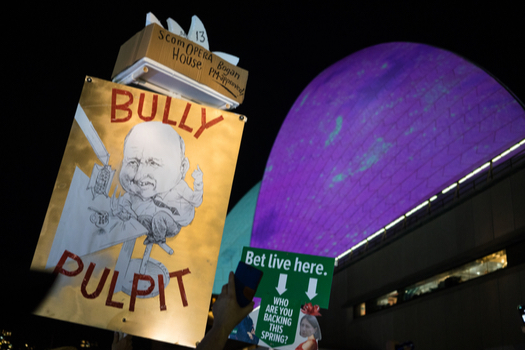Comment from Peter Saxon.
I recently drove into the dealership that delivered my now aging vehicle almost 10 years ago, hoping to be seduced into trading it in for the latest model.
Of course, that would have been the easy part. Coming home and selling the idea to my wife that I’d changed my mind about keeping the car until it became a collectable was going to be about as easy as convincing Kim Jong-un to trade in his nuclear weapons and squander the proceeds on feeding his people.
I could feel a dozen eyes on me as I parked the old bomb in one of the bays marked “customers.” The surge of excitement enveloping the place was palpable in the way dormant fleas are roused from hibernation by the first dog of spring that comes into range.
I walked into the showroom wearing my second best sandals, crinkled shorts and an old tee-shirt (circa the same vintage as the car) which had only one small laksa stain, about a centimetre at 10 o’clock from the belly button. If nothing else, the stain was fresh.
The salesman looked me up and down and, given the parlous state of car sales at present, decided I was a strong prospect – as compared to all the other prospects in the showroom at the time – which, including me, numbered one. So, he gave me the keys to a demonstrator and told me to take as long as I like. Of course, I fell in love with the car. New ones will invariably drive better, smoother, quieter and sport a lot more high-tech kit than one a decade old.
I was trying desperately to look nonchalant as I handed back the keys. Nonetheless, I made the mistake (I thought) of letting the sales guy know that I was enthusiastic about the car when I commented, “This car has more computer power in its dashboard than the entire moon landing.”
My expectation was that he’d respond with something like, ‘Yes, it’s incredible, isn’t it.’
After all, that’s what a good salesperson would do: take every opportunity to agree with the prospective buyer. Especially if the prospect is “selling themselves” by telling you what they like about the product.
Instead, he replied, “That’s if you believe it (the moon landing) ever happened.”
“Huh????”
Eager to explain, he says, “Everybody knows, that it was all filmed in a studio and they never reached the moon.”
Up for the challenge, I explain, “Everybody, or at least those who are old enough to have actually witnessed the events of 1969, also knew that the USA was involved in a space race with the Russians who were perfectly capable of tracking Apollo 11 to the moon and back and would have blown the whistle with glee if they could prove it was all a hoax. Besides, having gotten away with such a grand conspiracy once, why would you push your luck and go to the moon six more times?”
Letting logic through to the keeper and seemingly oblivious to the fact that he was being paid by the dealership to sell cars, not conspiracy theories, he doubled down and told me, “It’s like 9/11. Everybody knows that the Jews didn’t turn up for work that day.”
At that point I’d had enough. I looked at my watch and exclaimed, “My goodness, is that the time!” I felt we’d reached a fair outcome.
He’d exercised his right to free speech and I exercised my right to take my business elsewhere. Everyone’s a winner, except his employer.
Some may argue, including myself, that my decision to walk away was irrational. This sales guy’s personal understanding of reality has little to do with the quality of the car I was contemplating. Techinically, all he did was put forward a point of view with which I disagreed. Should he be punished for that?
True, I wasn’t personally offended by what he said. At worst I felt it was distasteful. But as an old sales guy myself, I found his technique self-indulgent. His conspiracy theories have no place in the context of a conversation between him as a car salesman and me as a prospective buyer who he’d never met before.
While that episode may have cost our friend and his dealership one sale, on a much grander scale, 2GB has now lost more than 100 advertisers because of the language used by Alan Jones in his attack on New Zealand PM Jacinda Ardern. Estimates suggest the fallout is costing the network more than $100,000 every day while the situation remains unresolved.
The situation is so bad it forced MacRadio chairman Russell Tate to take the unprecenred step of writing a letter to advertisers vowing to conduct a review of all 2GB/4BC Breakfast content. In the letter, he said Macquarie stations and presenters will continue to initiate and encourage debate on important issues but “must do so in language and tone that all of contemporary Australia finds acceptable.”
Those carefully chosen words spell out exactly where Jones’ problems lie. On too many occasions in the past, he’s been tone-deaf as to what all of contemporary Australia (not just his listeners) finds acceptable.
Just last year, he ran foul of the ACMA, as well as some advertisers, when he dropped the N-word in reference to machinations within the Liberal party. Worse still, he clearly knew it would cause controversy, yet in an act of defiance used it regardless, saying, “The n—– in the woodpile here, if one can use that expression – and I’m not going to yield to people who tell us that certain words in the language are forbidden.”
Well, yield he did and then was forced to apologise on that occasion as he has done so many times before.
This time, I fear things may be different. The chairman, Mr Tate has made it clear in a very public statement that there will be no more chances for Mr Jones. It’s a promise that “contemporary Australia” will, no doubt, ensure he keeps.

Peter Saxon


